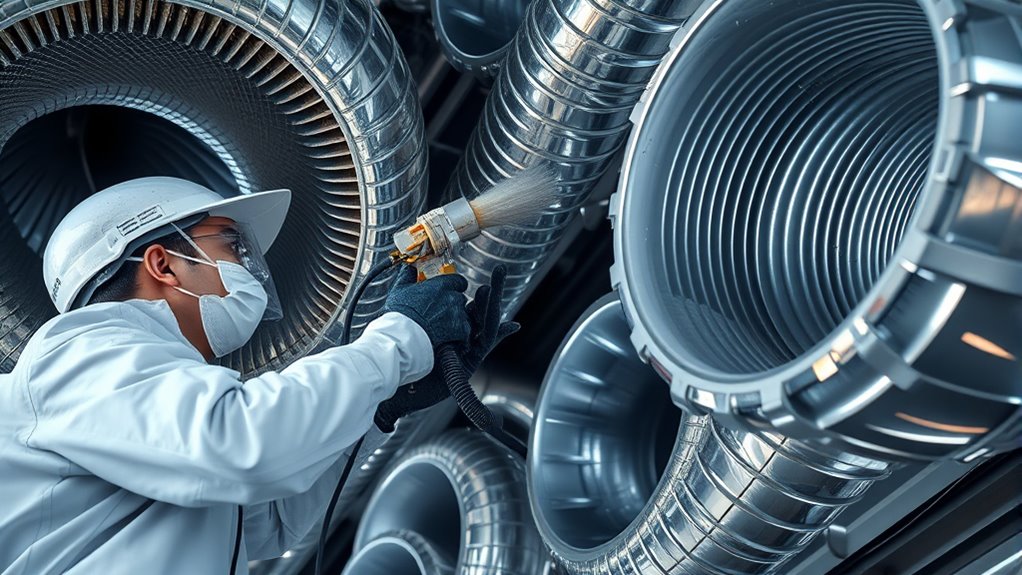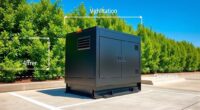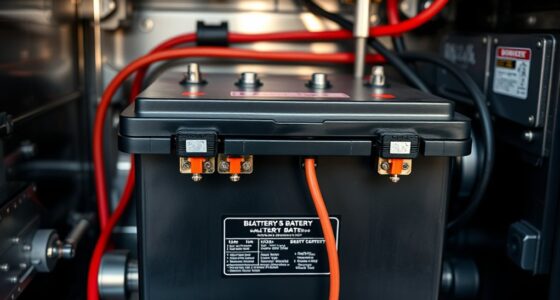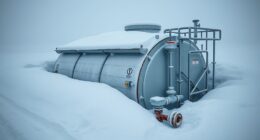To keep your vehicle running smoothly, regularly clean your air intake and exhaust systems. Check and replace your air filter before it gets clogged to prevent dirt and debris from reaching your engine. Inspect the exhaust system for rust, leaks, or blockages, and remove any obstructions. Proper maintenance guarantees better airflow, improves performance, and reduces emissions. Keep up with these tasks, and you’ll discover more ways to boost your vehicle’s efficiency and longevity.
Key Takeaways
- Regularly inspect and replace the air intake filter to prevent dirt buildup and maintain optimal filtration efficiency.
- Clean the air intake system using appropriate cleaners or professional services to remove dust, debris, and oil residues.
- Check the exhaust system for rust, leaks, or blockages, and perform repairs or replacements as needed.
- Use high-quality, performance-enhancing filters to improve filtration and extend system lifespan.
- Schedule routine maintenance, including professional cleaning when necessary, to ensure unobstructed airflow and emission compliance.
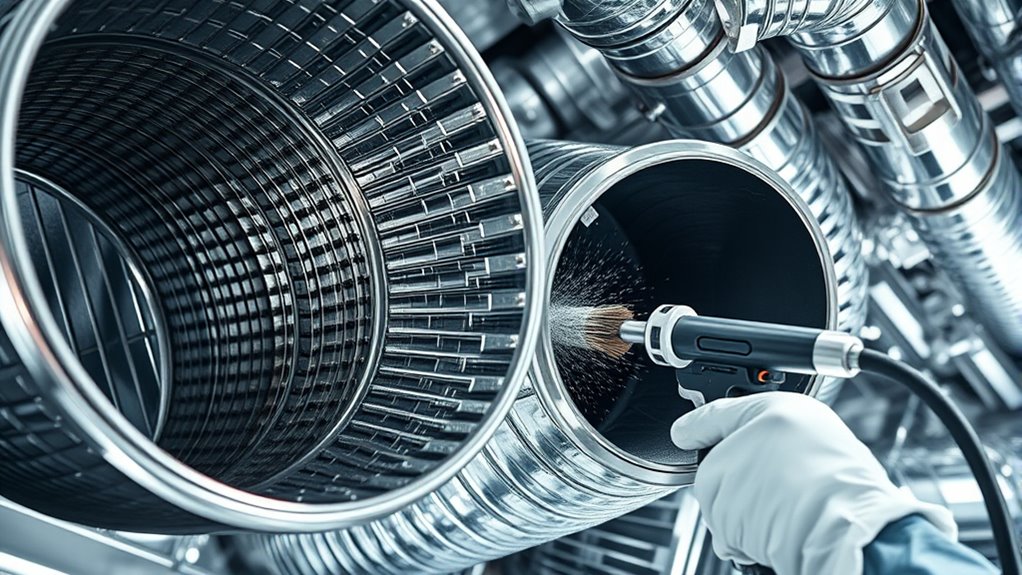
Regularly cleaning your air intake and exhaust systems is essential for maintaining ideal engine performance and fuel efficiency. When these systems become clogged or dirty, your engine struggles to breathe properly, leading to decreased power, higher fuel consumption, and increased emissions. To prevent these issues, you need to focus on the filtration efficiency of your air intake filter and adhere to a consistent maintenance schedule. This proactive approach ensures your engine receives clean air and exhaust gases are expelled efficiently, keeping everything running smoothly.
Your air intake filter plays a crucial role in protecting your engine from dirt, dust, and debris. Over time, these particles accumulate, reducing filtration efficiency and allowing contaminants to bypass the filter. When this happens, the engine’s internal parts can wear prematurely, and performance drops significantly. Regularly inspecting and replacing the air filter according to your vehicle manufacturer’s recommended maintenance schedule is vital. Don’t wait until you notice a decline in power or fuel economy—schedule routine checks to catch issues early. This routine maintenance keeps the air intake system functioning optimally and prevents dirt buildup that can compromise performance.
Regularly inspect and replace your air filter to prevent dirt buildup and protect engine performance.
Similarly, your exhaust system needs attention to ensure it’s not obstructed or corroded, which can hinder the flow of exhaust gases. A well-maintained exhaust system improves engine efficiency by reducing backpressure and ensuring complete combustion. This not only enhances fuel economy but also minimizes harmful emissions. Regularly inspect the exhaust for signs of rust, leaks, or damage, and clean or repair parts as needed. Incorporating these checks into your maintenance schedule guarantees that exhaust gases exit your vehicle efficiently, preventing potential performance bottlenecks. Additionally, using performance-enhancing filters can help improve filtration efficiency and support engine longevity.
Implementing a consistent maintenance schedule means planning regular inspections and cleanings for both systems. It’s not enough to simply replace the filter once; you should also check hoses, clamps, and other components for wear or damage. Also, consider professional cleaning services for your exhaust system if you notice unusual noises or decreased performance. Staying on top of these tasks ensures your vehicle’s filtration efficiency remains high and that your engine can operate at peak performance levels. By following a disciplined maintenance routine, you extend the lifespan of your engine, save money on repairs, and enjoy better fuel economy.
Frequently Asked Questions
How Often Should Air Intake Systems Be Inspected?
You should inspect your air intake system every 12,000 to 15,000 miles or once a year, whichever comes first. During intake system inspection, check for dirt, debris, or damage to the air filter and replace it if necessary. Regular air filter replacement guarantees peak airflow, preventing engine issues. Staying on top of intake system inspections helps maintain engine performance and fuel efficiency, saving you money in the long run.
Can DIY Cleaning Damage Air Intake Components?
Did you know that improper cleaning can diminish an air filter’s lifespan by up to 50%? DIY cleaning can damage air intake components if you use harsh cleaning chemicals or scrub too aggressively. It’s best to handle delicate parts carefully, avoid using strong chemicals, and follow manufacturer instructions. This way, you prevent damage and ensure your air filter and intake system stay efficient and long-lasting.
What Are the Signs of Exhaust System Clogging?
When your exhaust system is clogged, you’ll notice signs like increased exhaust fumes, which may smell stronger or be more visible. You might also experience reduced engine performance or difficulty starting your vehicle. Clog indicators include strange noises, such as rattling or hissing, and a decrease in fuel efficiency. If these symptoms appear, it’s a clear sign that your exhaust system needs inspection and possible cleaning to prevent further damage.
Are There Eco-Friendly Cleaning Options Available?
Yes, eco-friendly cleaning options are available. You can choose biodegradable cleaners and eco-friendly products that effectively clean your air intake and exhaust systems without harming the environment. These products often contain natural ingredients and avoid harsh chemicals, making them safer for you and the planet. When selecting cleaning solutions, look for certifications or labels indicating their eco-friendliness to guarantee you’re making a responsible choice.
How Does Cleaning Impact Engine Performance?
Cleaning your air intake and exhaust systems is like giving your engine a revitalizing burst of fresh air. It boosts airflow efficiency, allowing your engine to breathe easier and run smoother. As a result, you’ll notice improved fuel economy and better overall performance. Regular cleaning prevents buildup that can choke your engine’s power, ensuring it operates at peak efficiency. Keep those systems clean, and your car will thank you with reliable, optimized performance.
Conclusion
Regularly cleaning your air intake and exhaust systems is like tuning a car’s engine—you keep everything running smoothly and efficiently. I once neglected mine, and my engine sputtered, costing me a hefty repair bill. Think of your system as the lungs of your home or vehicle; when they’re clogged, performance drops. Stay proactive, clean often, and you’ll breathe easier knowing your system runs at its best—like a well-oiled machine ready to go.
